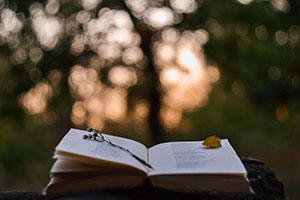Is time travel possible? Why write another novel about it?
Jack Ross chats with Bryan Walpert, Devonport resident and author of the 2022 Ockham short-listed novel Entanglement, about time travel, the challenge of putting science into a novel, crossing the border from poetry to fiction, science fiction vs. science-in-fiction, and more.
Books will be available for purchase.
•
As a researcher [at the Centre for Time at the University of Sydney] was settling me into my cubicle, he gave me some advice: Don’t think about it too hard and you’ll know what time it is; think about it too much and you’ll confuse yourself. As it turns out, this more or less describes our relationship with time as expressed by St Augustine some 1800 years ago. He wrote, “What then is time? If no one asks me, I know what it is. If I wish to explain it to him who asks, I do not know.”Luckily for me, Bryan has already given us some pretty strong clues about how to interpret his novel Entanglement. In particular, the notion of whether or not the past and future are 'really' there is canvassed quite extensively:
Somewhat stranger than this, to me at least, is the question of how real the past and future are. Most of us have an intuitive sense that events in the past (e.g. the French Revolution) are no longer happening and that the future doesn’t exist until we, well, get there ... This corresponds with what has been called the “tensed” theory of time or “presentism.” But there are also proponents of what’s called the “block universe” or sometimes “eternalism.” By that way of thinking, the past, present and future all exist.His Newsroom article on the subject even gives us the moment of inception of the book:
When I’m asked what led me to write Entanglement, I recall the moment some years ago that inspired it. It was a summer’s day. I was standing just outside my house, my family waiting for me inside, and felt, suddenly, as though I’d come back from the future, some darker time — though what the future was I didn’t know. My kids are so young again, I remember thinking. My wife and I are amazingly young, too.If you'd like to hear more about these weighty matters, please come along to the Devonport Library this coming Tuesday to listen to me and Bryan discussing his fascinating novel and the myriad questions it poses.
I felt like I had been given another chance. I thought, There are so many mistakes I hadn’t yet made. It was a strange and powerful feeling, though it didn’t last — the moment passed. Or maybe the moment is still and eternally there in its little corner of the block universe ...
– Bryan Walpert, ‘Is time travel possible? Yes-ish’ Newsroom (3/3/22)
Once again, this event has been made possible by the Devonport Library Associates: chair Jan Mason, events organiser Paul Beachman, and publicity courtesy of Linda Hopkins.
Bryan Walpert is the author of four books of poems, most recently Brass Band to Follow (Otago UP), named among the top 10 poetry collections of 2021 by the NZ Listener. He is also the author of three books of fiction, including the novel Entanglement, short-listed for the Jann Medlicott Acorn Prize for Fiction at the 2022 Ockham New Zealand Book Awards. A Devonport resident, he is a Professor of Creative Writing at Massey University-Albany.
•



















 Can poetry save the Earth?
Can poetry save the Earth? 








